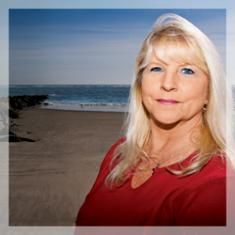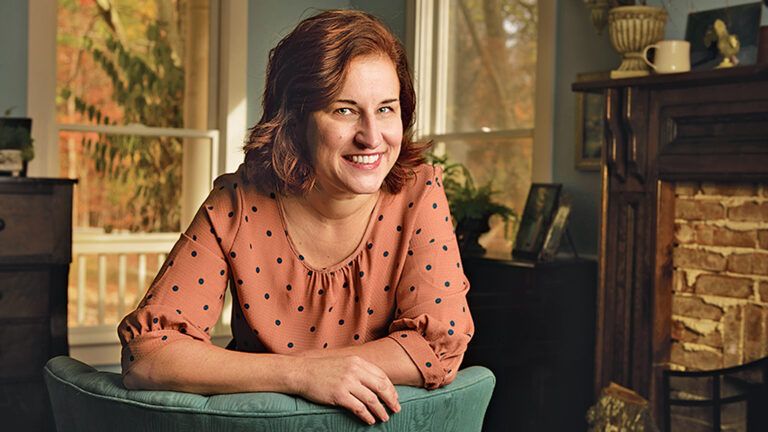Saturday, April 30, 2005. Almost a week had passed. A week since my son, Troy, 15, and his friend Josh got into a two-man sailboat—minus the sail, and with a patched-up hole in the hull—and vanished into the blue Atlantic. A week in which—for me, my husband Jewel and the rest of Troy’s and Josh’s families-—each day had passed like a lifetime. Now I sat on the back porch of a beach cottage on the Isle of Palms, just off of Charleston, our hometown. My pastor, Jim Weathers, sat with me, but we were silent. Just the sound of the distant surf, like a relentless reminder.
Some well-wishers loaned the cottage so that Troy and Josh’s families and friends could stay close to the spot where the boys’ boat had gone into the water. The sea wasn’t visible from where we sat, and that was just as well. I grew up around the ocean and I’d always gone to it for comfort. For strength, even, as if its depths and the power of its tides could be drawn upon in some small human measure. Yet how could so sovereign a piece of God’s handiwork be responsible for such anguish?
An endless parade of relatives, volunteers, reporters and officials circulated inside the cottage, just as they had ever since we’d moved here. The constant flurry of activity exhausted me. But it was a blessed distraction as well. Without these good-hearted people, without the never-ending details of reviewing where the latest search parties had been and where to look next, I would have been left alone with the reality of the situation: a reality that day by day was becoming ever more unbearable.
For the last few days, the subject of a memorial service for Troy had been edging closer and closer. Pastor Jim and I had talked around the issue, neither one of us wanting to cross that terrible threshold. Two days at sea—maybe even three or four—were survivable. But a week in an open 15-foot boat, with no food or water?
Now I took a deep breath of sea air and said, “I guess there’s no putting it off anymore. We need to talk about the service. I need to accept the reality of the situation.”
Acceptance. Had I ever known what that word really meant before this week? I’d tried to do everything in the world not to accept the situation. What mother wouldn’t? Last Sunday night, realizing Troy hadn’t checked in after a day of fishing—even though he never failed to normally—I instantly came up with half a dozen reasons why he hadn’t called. I phoned Josh’s parents. They hadn’t heard from him either. I phoned Tony, Troy’s dad, from whom I am divorced. No word.
I tried to stay calm and believe there was a logical explanation that would defy the fear that was slowly twisting my heart. But eight hours later, after a panicked night spent searching for the boys’ vehicle, that hope for a logical explanation had vanished like my son. Then the first glimmer of a clue: A chopper reported sighting the hull of a small, overturned sailboat in the waters south of Charleston. I fought against a spasm of despair. If Troy and Josh were out of the boat, their chances of staying alive would drop drastically. Half an hour later, another report: The boat had algae on the hull. It had been in the water for some time. It wasn’t Troy and Josh! Maybe the boys were still in their boat. Perhaps one of them would even call.
Then, at 10:00 a.m., the Coast Guard located Josh’s black Ford Explorer and empty boat trailer on the beach at Sullivan’s Island, just south of the Isle of Palms. Troy and Josh’s cell phones were on the front seat. They’d gone out on the water with some fishing gear, wearing jeans and T-shirts. The riptide at the spot they’d put in was so strong, a Coast Guard officer told me, it could have pulled the boys beyond sight of land in under a half hour. I knew then that all the challenges to my faith up to that point in my life had only been preludes to what was to come.
Jewel and I spent Monday night at Holy Cross Episcopal Church, just a mile from where the boys had put in. The Coast Guard turned it into a mission control. I wanted to stay close. I wasn’t going home without Troy. Tuesday afternoon—day three—Jim took me aside and said, “Deb, I want you to tell me what you’re going to say to God if the boys aren’t found. Yell if you want. Scream and holler. We’re not going to give up hope, but you need to be emotionally prepared for the worst. If you’re not, this will kill you.”
I tried. I tried to find that anger, that rage at God you sometimes hear people talk about. Why? Why? But all I felt was sadness—a sadness as deep and wide as the ocean that had swallowed up my boy. What was there to say to God?
That same afternoon, the Coast Guard called all of Troy’s and Josh’s relatives together. “It’s been almost seventy-two hours,” the search leader told us. “We’re obliged to call off the search at this time.”
No! That meant the end of all the high-tech gear, the helicopters, the state-of-the-art equipment. It was a recovery mission now. If the boys were still alive, their chances of being found had just dropped from slim to essentially nil. Listening to the officer talk, I felt myself go another rung down the ladder. With each piece of bad news, I was getting closer and closer to the ultimate moment. The one that, I knew, Jim was trying to prepare me for.
“The Department of Natural Resources will keep the search going on a smaller scale,” the Coast Guard officer told us. “There could still be a miracle.” But there was a distance in his voice, more like an echo than a true conviction.
The parishioners of Holy Cross had been so patient, but it was time to give them peace. Jewel and I went home. I lay in Troy’s bed, holding his pillow. The next day, more folks came forward: The owners of the beach house lent it to us to continue our seaside vigil. Then Rich Goerling, an uncle of Josh’s in the Coast Guard Reserve, flew in from Oregon to help direct the operation. My hopes got a boost.
And like every other boost I’d gotten, it ended in disappointment. This afternoon, after days of nonstop work, Rich was going home. Any minute now, I knew, he would come out onto the porch of the cottage where Jim and I sat talking about the service and say his final goodbye.
“Jim,” I said. “I don’t know how much more of this I can take. I really mean it.”
“Deb, I have a confession to make. I’ve never been in a situation like this before. I honestly don’t know what to tell you. Except that I need God’s help for what’s next every bit as much as you do.”
Jim and I bowed our heads. It was a reflex as much as anything by now, reflexive in the deepest sense. Throughout this week there had always been God. Now there was only God. Lord, I said, I will miss Troy every day that I’m alive. But I know you are with him and have been with him from the moment he disappeared. Thank you for holding my son close. I know you love him even more than I do, though I don’t understand how. I need that love. Only your love will allow me to accept this. With a deep sigh, I let go of my prayer. Filling the space it left, there was a small spark of something. Hope. Or acceptance. Or love. It was something I knew would heal and nourish me.
A minute later, Rich came outside with Jewel and Tony. Jewel took a picture of me, Jim, Rich and Tony. Then I went inside. I was talking with a group that had just gotten back from searching the beaches several miles to the north when a cell phone went off. That was nothing unusual with so many people around. Then I heard Tony shouting, “Troy! Troy!”
I ran over to Tony. Why was he shouting? He still had his cell to his ear. “What is it, Tony? What’s going on?”
Tears fell from his eyes. “I’m talking to Troy.” Through the cheers of joy that followed, the story gradually came in. An hour before, a fishing boat had found the boys seven miles off Cape Fear, North Carolina—111 miles north of the area where the Coast Guard had been conducting its primary search. The boys were baked by the sun and dehydrated, but essentially—miraculously—
Word spread like wildfire. Rich got the call at the airport before he boarded his plane. The following day—Sunday—our church was overflowing with people wanting to celebrate the boys’ safe return and to praise God.
I too praised him for Troy’s return. Yet there was a deeper gratitude I felt—not just for the return of my son, but for a more profound understanding of faith than I’d ever had. A closeness to a power deeper than any sea, a power that would never leave me.





